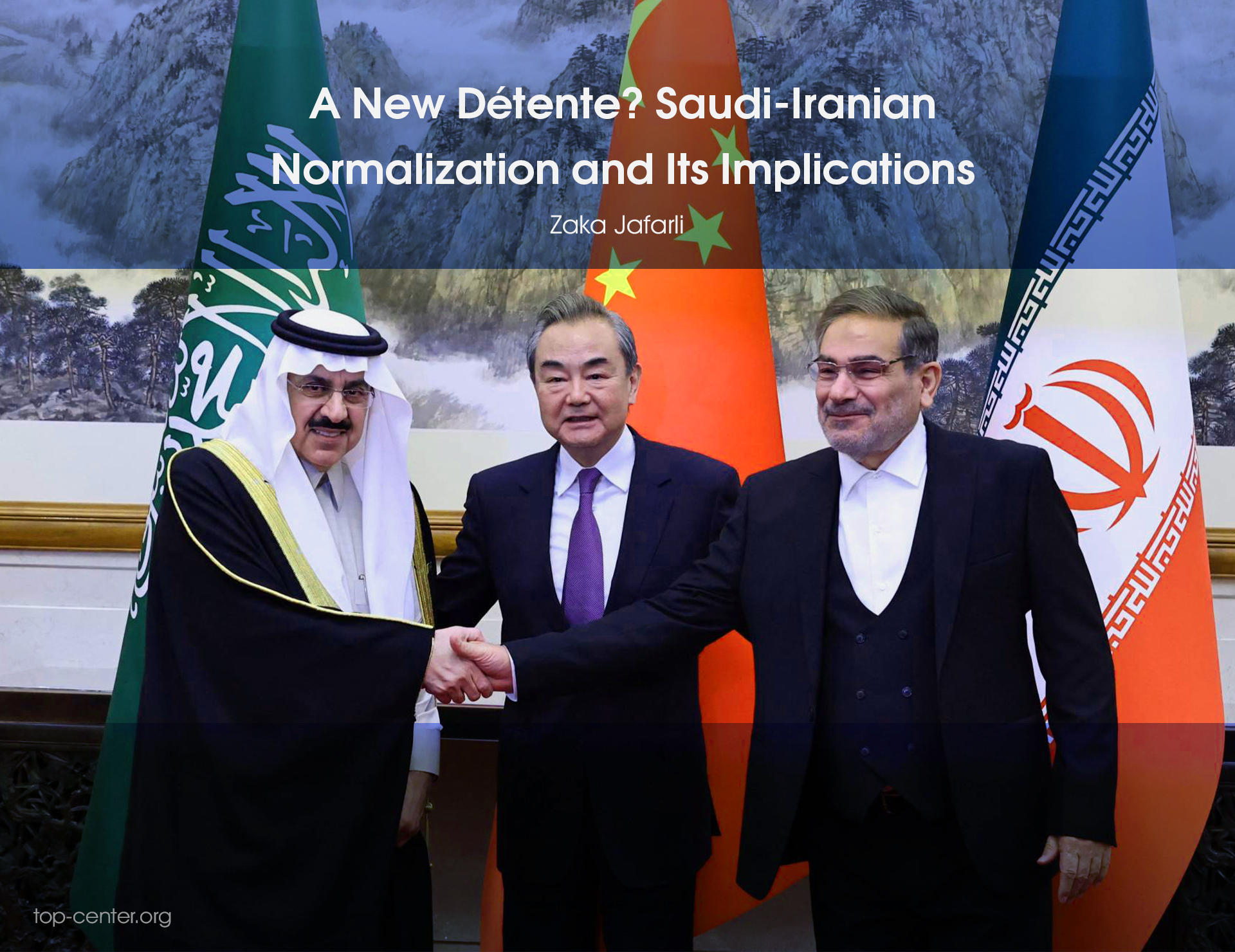A New Détente? Saudi-Iranian normalization and its implications

The agreement on the restoration of diplomatic relations between Saudi Arabia and Iran, mediated by China on March 10, is one of the most important events in the Middle East region in recent years. Even though the negotiations on the restoration of relations between the parties have been going on for almost two years, the time and place of reaching this agreement is of particular importance. If successful, this deal has the power to influence the processes that will take place not only in the Middle East region, but also on a global scale.
Although the roots of the conflict between Saudi Arabia and Iran go back to the Islamic Revolution of 1979, the reasons for the breakdown of diplomatic relations are more recent. In response to the attack on the country's embassy in Tehran after the execution of Shia cleric Nimr al-Nimr in Saudi Arabia in 2016, the Saudi leadership decided to suspend relations with Iran. However, this decision in itself was not only related to the killing of the Shia cleric. The US invasion of Iraq in 2003 and the wave of protests that engulfed the Arab countries since 2011 and the subsequent processes led to the aggravation of relations between Saudi Arabia and Iran. It should be taken into account that the strengthening of Iran in various countries in the region, especially through the local Shias, has become an existential threat to the leadership of Saudi Arabia, where the most important oil fields and industrial zones are located in the majority Shia Qatif region. Along with all this, the fact that the Obama administration conducted the process of nuclear negotiations with Iran without coordination with Saudi Arabia and actually turned a blind eye to Iran's regional activities undermined the trust of the Saudi elites in the US leadership and especially the security apparatus of the Democratic Party and made them unilaterally cut their relations with Iran. Saudis were concerned that the negotiations of the Obama administration with Iran will not end with the removal of the sanctions and Iran's return to the global financial system, and the United States will provide Iran with the opportunity to influence processes at the regional level and become a structural player in the security architecture of the region, thereby making Saudi Arabia lose its role as the main ally of the United States in the Middle East. In the eyes of Saudi Arabia, Iran had already virtually surrounded the country through the Shia groups it supports in Iraq from the north and the Ansar Allah movement, which is its ally in Yemen, from the south. The Obama administration's 2014-2015 support for Iran’s Shia militia proxies in Iraq as part of the fight against ISIS and its weaker-than-expected response to 2015 seizure of the capital Sana'a by Ansar Allah in Yemen fueled the Saud family's concerns. In parallel, after the death of Abdullah bin Abdulaziz in 2015, the throne passed to his brother Salman bin Abdulaziz, and Salman brought his young and ambitious son Mohammed bin Salman to the leadership of the security apparatus. In 2016, with the election of Donald Trump as the president of the United States and the strengthening of the neoconservative block of the Republican Party in the White House, Mohammed bin Salman managed to fully consolidate his power by eliminating rivals within the family one by one.
The Trump administration, especially National Security Adviser John Bolton, Secretary of State Mike Pompeo, and Jared Kushner, the president's senior advisor and son-in-law, have taken a completely different direction than their predecessors in the Middle East region, and the goal at the heart of this policy was to blockade and pressure the political regime in Iran, and even to overthrow it if possible. Thus, a de facto anti-Iranian coalition was formed, consisting of Republican neoconservatives in the United States, the Netanyahu administration in Israel, and Mohammed bin Salman in Saudi Arabia. Facts such as the Saudi leadership intensifying its military intervention in Yemen, putting Qatar under political and economic blockade, forcing the resignation of the Lebanese prime minister, and openly threatening Iran and its supreme leader showed the ambitions of the crown prince in 2017-2021 period. However, Donald Trump's loss of the presidential elections and the removal of Netanyahu from the position of prime minister caused the disruption of this trio and the change of the regional strategy of the Crown Prince.
In particular, the fact that the Biden administration is mostly composed of the former Obama administration staff and Joseph Biden's own position regarding Saudi Arabia during the election campaign became a source of concern for Mohammed bin Salman and led him to stop the blockade of Qatar without waiting for the change of administration in the United States and start negotiations with Iran from the spring of 2021. But contrary to expectations, the failure of the Biden administration's attempts to restore the nuclear agreement with Iran and the emergence of the need for the Saudi leadership to prevent turmoil in the global energy markets after Russia's military intervention in Ukraine strengthened the hand of the Crown Prince against the White House. Mohammed bin Salman's displeasure with the Biden administration and evaluation of any US move to conciliate with Iran as a step against the strategic security of the Saud dynasty has led to the tension in US-Saudi relations turning into an insoluble knot. Therefore, it is possible to say that the Saudi elite does not hesitate to show their distrust towards the Biden administration and the Democratic Party, and the unilateral restoration of relations with Iran can be attributed to this. At a time when the United States and Israel are seriously concerned about Iran's nuclear program and are even debating whether to target military-strategic facilities in Iran, it can be assumed that Saudi Arabia made the attempt to reconcile with Iran in order to protect itself from any potential escalation. Even during the period of the Trump administration, to which Saudis were very close, the Saudi leadership remembers that Iran's armed attack on the country's oil infrastructure in September 2019 went unanswered and does not want to be subjected to an armed attack again in any conflict between the United States, Israel and Iran.
Negotiations between Saudi Arabia and Iran are not new in themselves. After the conflicts in the 1980s, the parties tried to solve their problems, and in the 1990s they were able to make rapprochement. In 1998, Rafsanjani, the former president of Iran, and in 2007, President Ahmadinejad visited Saudi Arabia and held meetings with the country's leadership. However, later the relations between the countries again went sour. In recent years, the first attempt to restore relations between the two countries was made with a series of meetings held in Iraq in the spring of 2021. Later, in 2022, with the mediation of Iraq and Oman, the parties continued their meetings, but the protests in Iran last fall caused the meetings to stop. However, the Iranian side has conveyed to the other side several times that it is interested in restoring relations. The last such call was made in October of last year by Ali Akbar Velayati, the foreign policy advisor to the Supreme Leader of Iran. China's mediation most likely became the case after President Xi Jinping's visit to Saudi Arabia in December, and it was solidified during Iran's president's visit to China last month.
The Saudi-Iranian reconciliation is an important event that is expected to stimulate many processes at the regional level. If the parties manage this process successfully, it will be possible to talk about ending the political-economic crisis in Lebanon and the war in Yemen. The Iranian side is trying to improve its relations with the Gulf Arabs, especially at a time when relations with the United States and Israel are tense, in order to block the emergence of a united front against it and, to a certain degree, legitimize its achievements of the last two decades. Immediately after the agreement was reached, the statements of Iran's official press agencies and the leaders of its regional allies show that the Iranian leadership considers the normalization of relations with Saudi Arabia, especially the fact that this agreement was made through the mediation of China, a serious achievement. The main goal of the Iranian leadership with this deal is to reduce its regional problems at the time of domestic socio-economic crises and even attempt to reduce the impact of sanctions by accessing the financial resources of the Gulf countries. According to the information about the agreement, the Saudi side will also consider the concerns of the Iranian leadership regarding the Saudi-funded "Iran International" channel, which has become immensely popular in the country. As a continuation of this process, it is expected that Iran will normalize its relations with Bahrain, the last country in the Gulf without diplomatic ties, thus resolving its conflicts with all of the Gulf Arabs at least for the near term.
Adding to the conflicting and confused position of the Biden administration's on Iran the de facto victory of the Assad regime in the Syrian civil war, the impossibility of neutralization of the pro-Iranian Shia groups in Iraq and Lebanon, and the fact that the Ansar Allah group has not yet lost control of the country's capital and the northwestern territories in the conflict in Yemen that has been going on for 8 years, Saudis have come to the conclusion that that the active continuation of the conflicts between two countries is harmful for both sides. Mohammed bin Salman certainly does not want to be caught in the middle of a clash between the West (America and Israel) and Iran at a time when he is trying to turn his country into a regional and even global center of attraction - economically. It is possible to note that the current policy of Saudi Arabia coincides with the policy of the United Arab Emirates in the last two years. Unlike Saudi Arabia, during the Trump administration, the UAE fully normalized its relations with Israel, then fully restored its relations with Iran and even began to turn a blind eye to the participation of Emirati companies in the mechanisms created for Iran to avoid sanctions. The Saudi leadership, therefore, will on the one hand, continue its relations with Israel in a covert manner, and on the other hand, conduct a policy of de-escalation with Iran. Although it is questionable which direction this process will go in the coming months, it is clear that the two countries are not willing to return to open conflict.
China has undoubtedly become the winner of this process. Reconciling the two blood feuding enemies of the Middle East is a huge positive for China's global prestige. China is the largest trading partner of both countries, and by solving the problems between these countries from which it supplies energy resources, it is trying to prevent problems that may arise for itself. However, while considering China's important economic and diplomatic power in the region, it should also be noted that China, currently, does not have either the power, or the desire to play the role played by the United States in the Middle East. China does not wish to actively take sides in conflicts and is not seriously concerned about the presence of the United States in the region. China's role in this process is more related to the problems between Saudi Arabia and the Biden administration. By agreeing to China's mediation, the Saudi leadership is trying to use China's influence over Iran to its advantage and to send a message to the White House.







